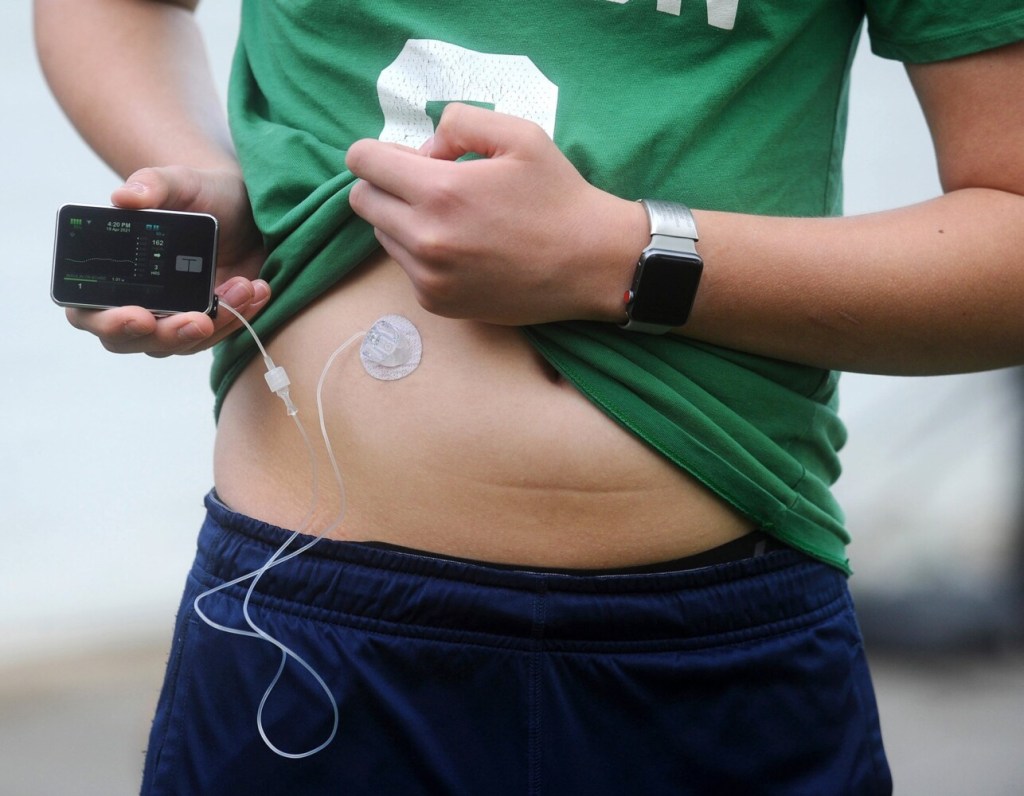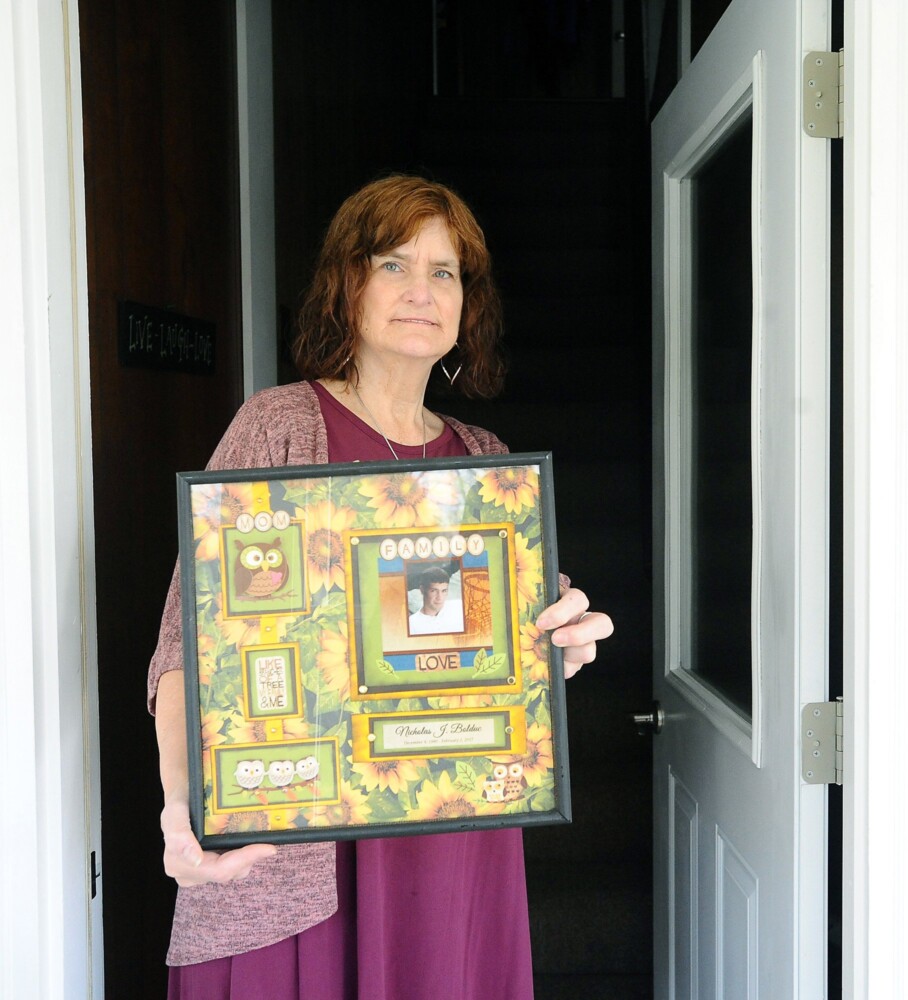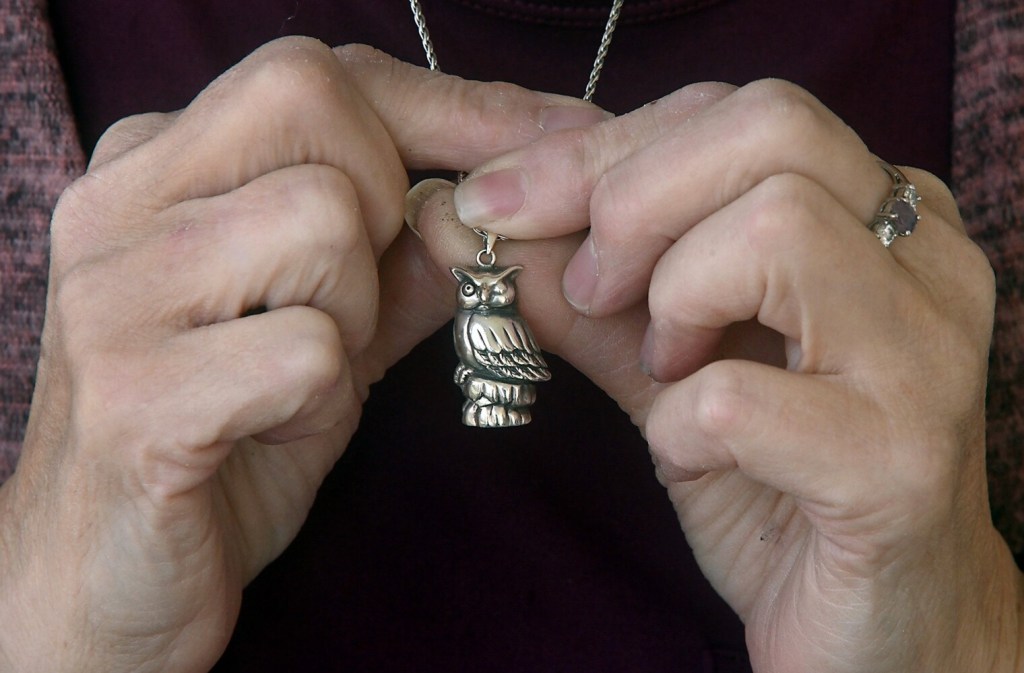WATERVILLE — If Leo Koch could choose one thing to spend his time on, it would probably be basketball. The 14-year-old plays on his school’s team and spends his free time following the Boston Celtics. In 2018 he went to a Celtics game in Boston, and he can still tell you the date, time and score of the game.
Koch might appear a normal teenager, but part of him is always aware of his Type 1 diabetes. As if growing up isn’t difficult enough by itself, his disease sets him apart whether he is going to school, playing basketball or simply eating. He gets blood sugar alerts when he is in class. His blood sugar has crashed in the middle of class and his friends have had to take notes for him because he could not focus. He wakes up in the middle of the night if he needs to change his insulin pump and is tired the next day. His pump has broken right before a basketball game.
“Regular kids don’t have to deal with this, but I do,” Koch said in an interview.
Koch understands that Type 1 diabetes is an autoimmune disease, that his pancreas doesn’t make insulin, that he is dependent upon the artificial insulin that drug companies make.
While his family helps him handle his diabetes now, he worries about whether he will be able to manage the disease when it is his responsibility and what his fate may be if he is unable to. He knows that without access to insulin 24 hours a day, he will die.
Those thoughts motivated him to testify before the Legislature’s Joint Standing Committee on Health Coverage, Insurance and Financial Services on April 13 in support of LD 673, “An Act to Create the Insulin Safety Net Program,” alongside other Waterville residents including his mother, Hilary Koch, and Catherine Begin, another mother of a son who had Type 1 diabetes who had no safety net and died of the disease in 2017.
If passed, the bill would create a program that would make a 30-day supply of insulin available to eligible Maine residents for less than $35. Insulin is prohibitively expensive for people with diabetes, and the cost can lead some to reuse needles, not test their blood sugar often enough and ration their insulin, in some cases leading to death.

Leo Koch, 14, left, who has Type 1 diabetes, takes insulin with a self-regulating pump that carries insulin through a small tube into the site shown below his hand. Koch testified before a legislative panel in favor of a bill that would provide emergency insulin at an affordable price for Mainers who need it. Rich Abrahamson/Morning Sentinel Buy this Photo
In his testimony before the panel, Koch detailed the ways that his diabetes has followed him in his life, from the times when he was little and missed play time because his blood sugar was too low to times he could not eat with others because his blood sugar was too high, from how his body aches so much when his blood sugar is high to how it shakes and sweats when it is too low.
He told the committee how much he appreciated what his parents have done for him in his life, but he can’t help but worry about handling the disease in the future.
“I don’t want to think about it, but I still worry,” he said in an interview. “I still worry that one day what happens if my job doesn’t have the right insurance or if I can’t afford insurance. I do worry about it and I don’t want to.”
His mother, Hilary Koch, also testified at the hearing. She’s been an advocate for her son since he was diagnosed and is the T1 International Chapter Leader with the Maine #insulin4all Chapter.
Leo was diagnosed with diabetes when he was 2 1/2 years old, but he had health problems before then. When he was 6 months old, he was diagnosed with hydrocephalus, a brain condition that required several surgeries.
But Hilary Koch said that the diabetes was even more difficult to manage.
“At 2 1/2 we thought neurosurgery and hydrocephalus was difficult,” she said. “We had no idea. Diabetes really made hydrocephalus look like a cakewalk.”

Leo Koch, 14, left, who has Type 1 diabetes and must take insulin, took a break from basketball Monday to make time for his mother, Hilary, at their Waterville home. The Kochs both testified before a legislative panel in favor of a bill that would provide emergency insulin at an affordable price for Mainers who need it. Rich Abrahamson/Morning Sentinel Buy this Photo
She didn’t sleep through the night, always setting alarms to wake up and check Leo’s blood sugar levels. When he was a toddler, he wasn’t able to tell her if he felt his blood sugar dropping, and his parents would have to hold him down to prick his fingers to test his blood and give him insulin.
It’s gotten easier as he’s gotten older, but Hilary Koch still worries about the burden on her son and wishes that he could feel like a normal kid.
LD 673 is modeled after a Minnesota law that was passed last year, the “Alec Smith Insulin Affordability Act.” People with an urgent need — less than a seven-day supply of insulin — can get a one-time 30-day supply of insulin from their pharmacy for a $35 copay.
In most cases people can get the 30-day supply once every 12 months, although there are exceptions that allow people to use the program twice.
In mid-March, a federal judge dismissed a lawsuit brought by the Pharmaceutical Research and Manufacturers of America to block the law.
The push for the law in Minnesota was driven by the death of Alec Smith, a 24-year-old who aged out of his parents’ insurance and was unable to afford his $1,300 monthly cost of insulin. He attempted to ration his insulin and died.
To Caroline Begin, who also testified before the committee, that story is painfully familiar. Her son Nick was diagnosed with Type 1 diabetes when he was 24 and he struggled to adapt. He worked at Oakland House of Pizza but couldn’t afford his insulin and supplies. He didn’t test his blood sugar regularly, reused syringes and lancets until they hurt and rationed his insulin.

Catherine Begin holds fond memories of her son, Nick Bolduc, 36, who died with Type 1 diabetes. Begin lives in Waterville. Rich Abrahamson/Morning Sentinel Buy this Photo
Nick passed out at his apartment. His boss and a coworker found him and got him help, but they never told his mother because they didn’t want to worry her.
One day in 2017, while Nick was at his mother’s house, she noticed he seemed off. She thought it might be because of his blood sugar and asked if she could take him to the emergency room. He said he was fine.
Two days later, Nick’s younger brother found him on the floor. He had rationed his insulin and died.
“Even though he was 36, he’s still my kid,” Begin said. “It was really, really devastating, I can’t even tell you.”

Nick Bolduc, 36, son of Catherine Begin of Waterville, died with Type 1 diabetes. The photo was used on his funeral program. Photo courtesy of Catherine Begin Buy this Photo
Stories like these are what motivated Waterville’s state representatives, Democrats Colleen Madigan and Bruce White, to co-sponsor the bill.
Madigan said she heard about the issue from constituents and understands why it is such a personal and emotional issue for them. She pointed out that with the pandemic it has become even more difficult to access healthcare, likely making it even more challenging for people to get insulin.
“This is a life-saving medication — if you have Type 1 diabetes, you can’t survive without it,” Madigan said. “It’s dangerous to ration it and use less, so obviously it’s emotional for folks. People in our area have lost children or relatives because they didn’t have access to insulin.”
White said he knew of constituents who had to choose between paying for insulin and other necessities.
“I have heard from constituents who are fearful that they may not be able to obtain their life-saving insulin because the cost is prohibitive,” White said in a statement. “They are sometimes faced with having to choose between getting their insulin or buying food or even fuel.”
State Sen. Scott Cyrway, a Republican who represents Waterville, said he supports the bill, and that to him it is a cut and dried issue.
“To me insulin is one of these things that should be covered,” Cyrway said.
On the national level, Republican U.S. Sen. Susan Collins has done extensive work related to supporting people with diabetes and making insulin more accessible. She is the founder and co-chair of the Diabetes Caucus, and combating the rising costs of insulin has long been a priority of hers.
“Government at both the federal and state levels must continue to hold pharmaceutical companies, insurers, and middlemen called pharmacy benefit managers accountable to ensure this lifesaving medication remains affordable,” Collins said in a statement.
Now that the bill has had a public hearing, it will go to a work session where the committee has an opportunity to amend the bill before it votes to send it to the Legislature. After that the bill will be voted on in the House and Senate, and if passed will go to the governor.
For people like Leo Koch, life carries on, even as part of them is always worried about the costs.
“I really just want to worry about things like how to get Celtics tickets, but I do think about how someday I’m going to need to pay for insurance, and pay for insulin and all those things,” he said.
In his testimony before the panel, he did not begrudge the insulin manufacturers making a profit, but he did say, “It’s not my fault I have Type 1 diabetes, and it’s not right for companies to take advantage of me. My life depends upon insulin. … I shouldn’t be held hostage or die. No one should.”
For Begin, she said she wanted to testify because when she heard about the bill she knew it could have saved her son’s life.
“I hope it passes because it could save a lot of people’s lives,” Begin said. “It couldn’t save my son, but I’m hoping it could save others that need help in the future.”
Copy the Story LinkSend questions/comments to the editors.












Success. Please wait for the page to reload. If the page does not reload within 5 seconds, please refresh the page.
Enter your email and password to access comments.
Hi, to comment on stories you must . This profile is in addition to your subscription and website login.
Already have a commenting profile? .
Invalid username/password.
Please check your email to confirm and complete your registration.
Only subscribers are eligible to post comments. Please subscribe or login first for digital access. Here’s why.
Use the form below to reset your password. When you've submitted your account email, we will send an email with a reset code.